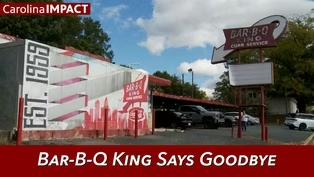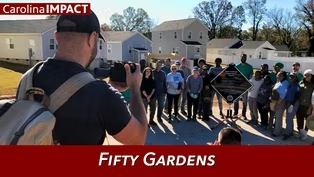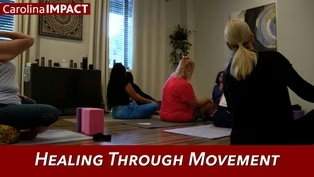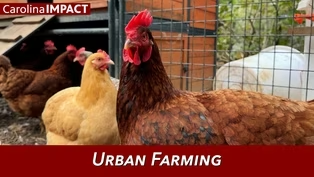
November 11, 2025 | Carolina Impact
Season 13 Episode 1310 | 27m 7sVideo has Closed Captions
Urban Farming, Fifty Gardens, Healing Through Movement, & Bar-B-Q King Says Goodbye
Healing grows in West Charlotte, where kids learn, play, and thrive at a therapeutic farm; No nearby grocery store? Mecklenburg's 'Edible Landscapes' program teaches how to grow your own; A local sex trafficking survivor transforms her trauma into hope; & Charlotte's iconic Bar-B-Q King announces it's closure.
Problems playing video? | Closed Captioning Feedback
Problems playing video? | Closed Captioning Feedback
Carolina Impact is a local public television program presented by PBS Charlotte

November 11, 2025 | Carolina Impact
Season 13 Episode 1310 | 27m 7sVideo has Closed Captions
Healing grows in West Charlotte, where kids learn, play, and thrive at a therapeutic farm; No nearby grocery store? Mecklenburg's 'Edible Landscapes' program teaches how to grow your own; A local sex trafficking survivor transforms her trauma into hope; & Charlotte's iconic Bar-B-Q King announces it's closure.
Problems playing video? | Closed Captioning Feedback
How to Watch Carolina Impact
Carolina Impact is available to stream on pbs.org and the free PBS App, available on iPhone, Apple TV, Android TV, Android smartphones, Amazon Fire TV, Amazon Fire Tablet, Roku, Samsung Smart TV, and Vizio.
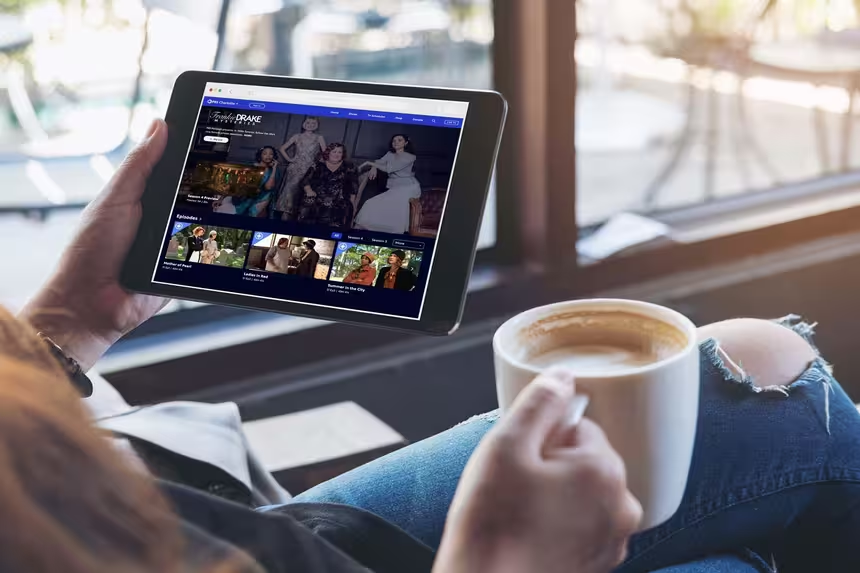
Introducing PBS Charlotte Passport
Now you can stream more of your favorite PBS shows including Masterpiece, NOVA, Nature, Great British Baking Show and many more — online and in the PBS Video app.Providing Support for PBS.org
Learn Moreabout PBS online sponsorship- [Announcer] This is a production of PBS Charlotte.
- Just ahead on "Carolina Impact," we'll meet a local family that turned a piece of the city into a thriving urban farm, plus see how one woman uses her trauma to strengthen others.
And after 66 years, a barbecue favorite closes its doors, find out why.
It's all on tonight's "Carolina Impact."
(bright music) Good evening, thanks so much for joining us.
I'm Amy Burkett.
In our region, there's a small farm doing big things for kids.
AAA Therapeutic Solutions isn't just growing produce, it's cultivating confidence, connection, and care.
"Carolina Impact's" Chris Clark shows us how families come here for fresh air and hands-on learning, but what they take home runs much deeper.
- [Chris] Inside a traditional classroom, you'll find rows of tiny chairs, fluorescent lights, and a box of crayons to spark the imagination.
(Dominique and kids screaming) Out here in West Charlotte the walls are made of sunshine and sky.
Instead of a bell, you'll hear the laughter of children and a chatter of turkeys.
(turkeys chattering) There are llamas and chickens to feed, rabbits to care for, and a zip line that teaches better balance than any worksheet ever could.
(zipline whirring) Welcome to AAA Therapeutic Farm where healing and learning take root in the open air.
- I love occupational therapy, but within a clinical setting I was getting burnt out and I felt like the clients that I wanted to serve, their treatments were being dictated based on insurance.
These families felt like they weren't getting the support they needed at schools.
I was trying to think, how can I mesh the two together?
- [Chris] She first explored the healing power of animals through hippotherapy, using horses to help clients build balance, confidence, and connection.
- I love that setting and I saw the therapeutic benefits of it, but I'm actually pretty fearful of horses.
(Dominique laughing) - [Chris] That led her to llamas, smaller, gentler, easier to handle.
But what about her husband?
- I was like, we're not getting llamas, this is crazy, whatever.
- [Chris] Famous last words.
Once he saw 'em in person, it didn't take long before even the skeptics were eating out of their hands or at least feeding them grain from a bucket.
- When I walked into the stable and my youngest daughter was maybe about two or three years old, and the llamas were moving out her way, and once I seen how gentle they were to her, I knew this is something that we had to have.
- [Chris] And that gentle moment became the spark.
- He knew it was slowly going downhill when we were hiding llamas in my parents' backyard, so.
(Dominique laughing) - [Chris] The family resettled on Charlotte's West side, started AAA Therapeutic Solutions and before Long had a full grown farm.
Each child doing their part, Amara handles the rabbits.
- I have to give them food and water, and I have to like change their hay sometimes.
- [Chris] Amari looks after the llamas and takes care of the chickens.
- And their eggs are different colors.
- [Chris] Universally despised is the Turkey.
- And he always follows us around and tries to pick at us - [Chris] More than a barnyard it's a living classroom, where preschoolers learn through movement, creativity, and connection with the natural world.
- Patterns they're not just drawing it on a worksheet, they're actually seeing it in nature so they can identify it on leaves, animals, even on each other's clothing.
So I feel like it makes simple things stick better so they're set up to be successful when they transition.
- [Chris] Oh, there's structure here, sure.
The kids do yoga, paint, and create something new every day, but like most preschoolers, their attention span is about as big as they are and their curiosity reaches even higher.
One moment they're counting vegetables in the garden.
(kid speaking gibberish) Next, they're on a mission spotting salamanders under logs.
- [Dominique] Don't touch.
What color?
- [Chris] Even the latest Camry equipment, everything becomes a teachable moment.
- It creates those concrete synapsis so it's like, okay, we learned about smooth and rough, but can I identify this outside of the book?
We're making it student led so that if they wanna dig deeper into it, they can.
- [Chris] The goal is to break a pattern that begins far too early.
One where children of color and children with disabilities are disciplined more often and more harshly than their peers.
According to the US Department of Education study, those first suspensions can become the first steps in what's often called the preschool to prison pipeline.
When bias or a misunderstanding of a child's needs leads to exclusion instead of support.
- Sometimes it's just a kid that's constantly overstimulated and extremely aggressive, where they can come here and they're just calm.
Like they don't even wanna interact with other people, they just wanna sit and watch the chickens for hours.
Even family members where it's like, if we would've took our child somewhere else, they would've got kicked out of school, they feel like their kids don't fit, and we don't want kids to feel like that.
We don't want them to feel like a puzzle piece that's in the wrong puzzle.
- [Chris] In a few short years since its inception, the progress has been remarkable.
- One kid never used to talk, I barely heard him talk, and one day I'm coming home and he said, "Mr.
Rell, Mr.
Rell," that kind of changed me.
I kind of looked at him and said, Wow, this is working.
- [Chris] It's in those little moments, a word, a smile, a spark of connection, where the real progress shows, small victories that speak louder than any lesson plan.
- This morning one of our kids that's nonverbal, he doesn't play with the other kids, but he likes watching, but seeing all his friends come up and say, good morning, like it just made me feel good like, he doesn't have to be in the mix, but he's still loved, and cared, and respected for by his peers.
- [Chris] And that's what Dominique and her team are building here, not just milestones but readiness.
- We wanna identify behaviors that might be a hindrance when they go to school.
We wanna prepare families.
We wanna be that support system.
We wanna make sure everybody's feeling included.
- [Chris] At AAA Therapeutic Farm healing takes many forms.
Sometimes it looks like a yoga pose, sometimes a laugh, sometimes it's a child whispering good morning.
And every one of those moments means growth is taking root.
For "Carolina Impact," I'm Chris Clark.
- Thank you so much, Chris.
Dominique and her family are showing how tending to the land can help grow stronger minds, healthier bodies, and a more inclusive community one child at a time.
From the fields to our own backyards, fall isn't just for harvesting, it's also prime time for planting.
Gardeners across the region are busy getting their beds ready, hoping to beat the frost and enjoy a little more color before winter sets in.
"Carolina Impact's" Jeff Sonier, and videographer Russ Hunsinger show us a local program that's helping homeowners turn a little bit of landscaping into a lot of food.
- Yeah, everybody wants a nice yard, but you know, yard work can also be hard work, so why not have more to show for it?
Not just a yard that looks good, but also a yard that tastes good.
(bright music) The shrubs that they're planting, well, they are very big, but these bushes grow blueberries.
- [Lapri] And these blueberries that we're growing are definitely gonna be my favorite.
- [Jeff] And the shade trees are all figs.
- Those figs will grow, you know, they're about foot now, in five years they'll be 10 to 15 feet, and they're gonna be loaded.
So their production kind of goes nothing, nothing, nothing, explodes.
Blueberries, they're gonna get about six feet wide, so every year the production's just going to increase, increase, increase.
- [Jeff] Steve Capobianco is the owner of Greenhand Gardens.
(earth auger rumbling) One of several partners in Mecklenburg County's Edible Landscapes program, installing their 50th community gardens since 2016, working side by side with volunteers here at the Meadows at Plato Price, a new Charlotte Habitat neighborhood just off Moore's Field Drive.
- We are not just planting seeds and soil, we are cultivating relationships, fostering community engagement, and promoting healthy living.
- And the idea came from working with communities to ensure that they would have access to their own food.
- Not only does it help address chronic disease, but also give people a source of self-respect and dignity in that they're not begging for anything, but they're producing for themselves.
- Okay, everyone ready?
- Yes.
- Set.
- All right, three, two, one.
- [Jeff] The volunteers take a quick break for group photos and then... (tools whirring) It is time to start building these raised beds where neighbors at Plato Price will plant their own produce.
- [Lapri] Grains, and cabbage, and potatoes, and things like that.
- [Jeff] All right in your backyard just about.
- Right in my backyard.
Right in my backyard.
I was not sure whether we had plants to do a garden, but I didn't think it was gonna be like this big of a garden.
We're here now, and I can't wait to put this key in the door, and call it home.
- [Jeff] We first met Lapri Holmes back in 2023 when she became a first time homeowner here at Plato Price - A half bath over here, and this is a closet.
- [Jeff] Do you like gardening?
- [Lapri] I do not.
(Jeff laughing) - [Jeff] And now Lapri is also becoming a first time gardener.
- Like rough it up like it needs a bad hair day.
Because if you don't, those roots just keep on round and round and round- - [Jeff] Getting her hands dirty alongside her new neighbors, while also getting some expert advice on everything from prepping the plants before putting them into the ground.
- [Bill] So you push in, mark, mark.
- [Jeff] To measuring and framing these two by tens for a do-it-yourself planting project that the whole neighborhood can enjoy.
(indistinct chattering) (tools whirring) The planting beds laid out just so.
- That way they all have a full-foot walkway in between this bed here, they can access the the tool shed.
- [Jeff] To help this new garden grow.
And once the beds are ready, the Edible Landscapes program even brings in this rich new black soil by the truckload to replace the old red clay that could delay their gardening success.
- And we want to have a much quicker success to bringing new soil in.
- [Jeff] For Edible Landscape, success is defined as making food both attainable and sustainable.
Bringing fresh and free produce to neighborhoods where shopping for tonight's dinner or tomorrow's school lunch often means paying too much or driving too far.
- It's hard to find food in this area, there's only like, maybe two good grocery stores, Walmart and Food Line in this area.
Other than that, we have to go pretty far out.
- [Jeff] Instead, gardens like this one here at Plato Price are teaching neighbors the skills to build their own and then to grow their own, and every new garden is a learning experience for the Edible Landscapes program too.
- This one I think is better than all the ones we've done in the past, mainly because it brings everything together.
Mainly this site was built to house this.
A lot of times people go back, oh, I wanna put a garden here.
Oh, you've got trees that are shading it, no access to water.
This one was built to where we have the sun, the water system was pre-thought out, installed, the beds are gonna be aligned with that to cut down on the maintenance drastic about upwards of 80%.
It's laid out nicely, the community is really close by.
We'll have edible plants for anyone who just wants to walk by.
It's a really open, welcoming space, - And one of 50 spaces across Charlotte and Mecklenburg County with real roots in the community, all from a program that year after year, season after season is still growing, one garden at a time.
Now, Mecklenburgs Edible Landscapes program doesn't just choose any neighborhood for a garden like this, in fact, it's also the neighborhoods that choose them.
And this particular garden at Plato Price, garden number 50, well, it turned out so well that now it may be the model for the County's next 50 gardens.
Amy.
- Thanks Jeff.
To find out more about Mecklenburg County's Edible Landscapes program, including all 50 garden locations, head to our website at wtvi.org.
It's a hidden problem in our communities and many shy away from talking about it, but tonight we're tackling the issue head on, human trafficking.
"Carolina Impact's" Dara Khaalid, and videographers, Marcellus Jones and Russ Hunsinger show us how one victim uses her survival story to give back and help others.
(gentle music) - [Dara] It's a sacred process for her, lighting sage, closing her eyes, and inhaling as she waves the white trail of smoke all around her body.
- [Desiree] They can expect deep relaxation- - [Dara] Then barefoot in her empty yoga studio, Desiree Eatmon spreads the earthy the aroma throughout, cleansing the space of negative energy.
- Desiree has such a wonderful calming way of leading a class.
- Let your shoulders go.
- [Dara] She takes the preparation for her weekly community yoga classes seriously, because it sets the tone for her.
- [Desiree] Roll your wrist away from each other.
- [Dara] As she guides students in a beloved practice that's helped her heal from trauma and reconnect with her own body.
- It started to feel like I was getting to know who I was.
Inhale up- - [Dara] Which was something Desiree desperately needed after surviving the unimaginable over 20 years ago.
- They put me on the phone with this scary sounding guy that said, "They're bringing you home to me, you're gonna be with me now."
And he just laughed this really creepy laugh and just kept saying, "They're bringing you home to me."
- [Dara] At just 13 years old, these were the daunting words she heard from her soon to be sex trafficker as kidnappers drove her to his Richmond, California home.
- It just felt like everything stopped and like it was me in the world and like just looking out the window, everything going by so fast, like, oh, that dread of like, I don't know what's about to happen.
- [Dara] It all started after Desiree met a couple at the hotel she was living at with her family.
They promised her a fun night out, but instead the man dropped her and the woman off in the San Francisco streets surrounded by prostitutes.
- While we were still standing there, a big police paddy wagon came and gathered all of us girls that were out there up in a circle and took us to jail.
The girl that I came with ran off.
- [Dara] Scared and alone in jail, Desiree met two older women who promised her breakfast and a ride back home once they were released the next morning.
Well, that ride home never came.
Instead, they took her to the trafficker's house where he raped her, made her call her mom to say she ran away, then forced her into sex trafficking.
- We got to the stroll like around 10:00 PM and then we would stay until 6:00 AM every day, seven days a week.
I had to give all my money that I made as soon as I made it to him so that I had no cash and couldn't run off.
- [Dara] This vicious cycle filled with violence went on for two years until Desiree had an extreme mental breakdown and called 911.
After leaving the hospital she was reunited with her family and discovered she was pregnant by her trafficker.
But she didn't let that stop her from getting her GED or graduating from college.
- With having a baby, I was very inspired to get my grown up life started.
Take your circles to the left.
- [Dara] and with that new grownup life came the discovery of yoga.
- I started out yoga for fun because I enjoyed it.
I practiced for years before I even knew that yoga was scientifically proven to heal trauma.
- [Dara] This is backed by a study published by the National Library of Medicine showing that yoga can significantly decrease PTSD, post-traumatic stress disorder symptoms.
Desiree didn't wanna keep these life-changing benefits to herself, so in March, over two decades after escaping sex trafficking, she launched her non-profit, Survivor Sanctuary, where she offers victims one-on-one yoga sessions, somatic movement training, and trauma recovery coaching.
- I have clients all over the world now because I do all of my appointments on Zoom, and we go over breathing techniques that can be used during panic attacks, during flashbacks, or any other difficult times.
- And I was able to speak with one of her clients who lives across the country and escaped sex trafficking at the end of last year.
For her safety, I promised to hide her identity, but here are some of the heartfelt words she shared about having someone like Desiree who understands her struggles and has the services that can support her.
- [Desiree's Client] I left with nothing, I left all of my belongings, and I know that she can relate with her group.
It's more about connecting with your emotions through your body and yoga.
- [Dara] Even on a cold, rainy fall afternoon, Desiree still works to help others.
This time she's jotting down words of wisdom from a few books she's reading, words that she plans to weave into her sessions with victims.
It's just one more way she can show them she truly cares.
And that as they continue to walk through their trauma, she'll be right there walking with them.
For "Carolina Impact," I'm Dara Khaalid.
- Thank you, Dara.
In addition to helping trauma victims heal through yoga, Desiree also gives them care packages that have yoga mats, essential oils, books, and personal development tools.
Well, wrapping up tonight, another one of our region's iconic restaurants has closed its doors for the final time.
The Bar-B-Q King had been a landmark since 1959, but closed its doors permanently on November 1st.
"Carolina Impact's" Jason Terzis joins us with the details and a look back at what made the Bar-B-Q King so unique.
- Well, it's never enjoyable to see one of the local iconic and nostalgic restaurants close up its kitchen.
And over the last few years here, we've seen plenty of it, Price's Chicken Coop, Green's Lunch, the Village Tavern, Oakhurst Grill, Zach's Hamburgers, that list unfortunately goes on, but this one hits particularly hard, especially for old school Charlotteans.
The Bar-B-Q King on Wilkinson Boulevard, famous for its drive up service, the car hops, barbecue fried chicken, onion rings, po boys and platters, it's been a staple on the west side for 66 years.
Wildly popular back in the '60s and the '70s with high schoolers, especially after Friday night football games, but despite its popularity, the land on which the business sits has been sold, which means the land will ultimately be redeveloped.
- The reaction of the customers has been tremendous.
We have seen faces that we haven't seen in last 10 years.
You know, might have moved away, they wanted to come for the very last time, and it's been a very emotional period for everybody, not just us that work here for so many years, but for the customers also that grew up here.
You know, there are second, third generation families that have come here.
- The city is growing.
You hate to lose these places.
We try to hang onto 'em as much as we can, and visit them, and support our local businesses in that regard, but you know, the clock is ticking.
- Now several years ago we featured Bar-B-Q King as part of our Carolina Cook documentary series.
Here's a look back at what made the Bar-B-Q King so unique.
(classical music) It opened nearly 60 years ago.
- It was just a gathering place.
- [Jason] Regulars have been coming in for years, decades, in fact.
- I've been coming to Bar-B-Q King 30 plus years.
- [Jason] They come for the food.
- The best barbecue in Charlotte.
- [Jason] The friendly service.
- Service has always been great - [Jason] And that feeling of yester-year.
- We drive over an hour to get here.
- It's just a nostalgic drive-in, that you don't see a lot of that around here anymore either.
- [Jason] No wonder this place has stood the test of time.
The Bar-B-Q King on Wilkinson Boulevard in Charlotte opened in 1959.
Here they've been dishing up everything from pulled pork to barbecue fried chicken, to homemade onion rings and hush puppies, and it's all brought to your car, old school drive-in style.
- You just don't see those types of things anymore.
- [Jason] Back in the '50s and '60s, it's how a lot of places operated.
- We had Westover Drive-in, we had town and country drive-in down here, and we just cut, you just cruising, cruising on Friday and Saturday night.
- [Jason] While others have closed up over the years, the Bar-B-Q King has survived, thanks to a few main reasons.
First and foremost, the food.
- I think that's one of the key ingredients to running a business for such a long time, is to have consistency of the food and the service.
- [Jason] Whether you came to the Bar-B-Q King back in the day or today, you'll notice that not much has changed, from the look of it outside to the call boxes where customers place orders, to the way the food is prepared.
- Whether it's a slaw, or the onion rings, or the totter sauce, or the homemade chili, it's the same recipes that have been here for many, many years from from really day one.
- [Jason] Everything here is made in-house with the exception of the French fries.
Today's menu looks almost identical to the one first used in 1959.
The barbecue plate, which sold back then for a dollar, is now 7.95.
And the barbecue chicken, which used to be just 80 cents, is now 6.95.
But what the Bar-B-Q King might be best known for, actually isn't their barbecue, it's their barbecue fried chicken.
- We take fried chicken, Southern fried chicken, and we dip it into our original barbecue sauce that we've been making since 1959.
- [Jason] The item was so unique and so popular that Guy Fieri featured it on the Food Network's "Diners, Drive-Ins and Dives."
- People once they saw the show, people came from everywhere.
California, Alaska, they came from Las Vegas, everywhere to try the barbecue fried chicken.
- [Jason] While out-of-towners are certainly welcome, it's the regulars who keep this place going.
- I usually always get the mint barbecue sandwich with onion rings and a sundrop and a hot dog every single time.
- Well, the po boys and the barbecue plates is my favorites.
- They laugh at me here 'cause I only order two things, I either order the quarter fried chicken, white meat, and onion rings, or I order a sliced barbecue sandwich and onion rings.
Onion rings is a must and the Cherry lemon Sundrop, must have.
- Brothers George and Gus Karapanos, and their Uncle Steve own, manage and cook at the Bar-B-Q King along with help from Steve's wife, Maria and George's daughter, Amanda.
But they might not be the most popular people here.
- How y'all doing today?
- [Jason] That honor goes to the Bar-B-Q King's red-jacket wearing car hops.
Thomas Cureton has been serving customers curbside for 40 years, David Anthony, 35 years, that's a combined three quarters of a century.
These guys are just as consistent as the food itself.
- The car hops always, they're always good, they're glad to oblige you anything you need.
- You get paid every day, you're a curb guy.
You get to meet people, the pay is good, the people is good.
It is an addiction.
You just like adrenaline that you deal with on a daily basis.
- Because I like the job, I love the job.
Customers, I love them to death, they love me too.
- Thomas has been working here 35, 40 years.
He'll come up the car, brings me my extra ketchup that I need.
He knows what I like, and don't have to ask and just automatically get the service you want.
- People come out here, I'll walk out the door, serving somebody else and I ain't even seen them pull up yet, and they hollering my name and stuff, you know.
"We waiting on you, we waiting on you."
- [Jason] Some of the regulars here have been coming in for decades, many since childhood.
- That's what I grew up in.
You know, what I grew up coming to and it's just, every time I come back here it's like going back to my childhood, you know, it's kinda like, brings back memories.
My dad used to send me here every Friday night, pick up a to-go order for the family.
- [Jason] What's amazing about the Bar-B-Q King is it's achieved all its success with little to no advertising.
It's all been word of mouth, and apparently a lot of people have been doing a lot of talking over the years.
For "Caroline Impact," I'm Jason Terzis reporting.
- I just love a good walk down memory lane, but it's sad to see it close.
Driven by there a million times.
- Yeah, I would too, especially if I had a little extra time going to pick someone up at the airport, like, Hey, let's make a quick stop, pick up some onion rings or that sort of thing.
Yeah, that story that you just watched originally aired in the spring of 2017, crazy to think it's been eight years ago since we did that.
Now it's just the era that we're living in.
With the city and the surrounding area continuing to grow, land getting more and more valuable, being scooped up by developers, but the memories, the nostalgia, all that will endure for generations.
- Always appreciate you taking us on that walk.
Thanks Jason.
Well do you have a heartwarming story like this?
It might make a great feature here on "Carolina Impact."
Please email the details to stories@wtvi.org.
That's all the time we have for this evening.
We always appreciate your time and look forward to seeing you back here again next time on "Carolina Impact."
Good night, my friends.
(bright music) (bright music) (bright music) (bright music) - [Announcer] A production of PBS Charlotte.
(bright music)
Bar-B-Q King Says Goodbye | Carolina Impact
Video has Closed Captions
Clip: S13 Ep1310 | 7m 6s | Charlotte's iconic Bar-B-Q King announces closure. (7m 6s)
Fifty Gardens | Carolina Impact
Video has Closed Captions
Clip: S13 Ep1310 | 5m 55s | No nearby grocery store? Mecklenburg's 'Edible Landscapes' program teaches how to grow your own. (5m 55s)
Healing Through Movement | Carolina Impact
Video has Closed Captions
Clip: S13 Ep1310 | 6m 1s | A local sex trafficking survivor transforms her trauma into hope. (6m 1s)
November 11, 2025 Preview | Carolina Impact
Preview: S13 Ep1310 | 30s | Urban Farming, Fifty Gardens, Healing Through Movement, & Bar-B-Q King Says Goodbye (30s)
Urban Farming | Carolina Impact
Video has Closed Captions
Clip: S13 Ep1310 | 6m | Healing grows in West Charlotte, where kids learn, play, and thrive at a therapeutic farm. (6m)
Providing Support for PBS.org
Learn Moreabout PBS online sponsorship
- News and Public Affairs

Top journalists deliver compelling original analysis of the hour's headlines.

- News and Public Affairs

FRONTLINE is investigative journalism that questions, explains and changes our world.












Support for PBS provided by:
Carolina Impact is a local public television program presented by PBS Charlotte
